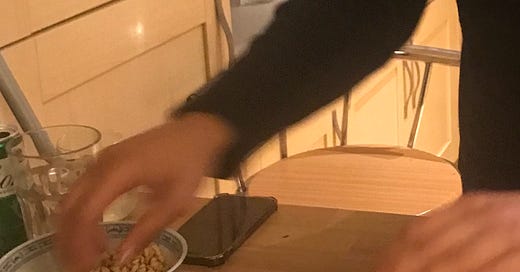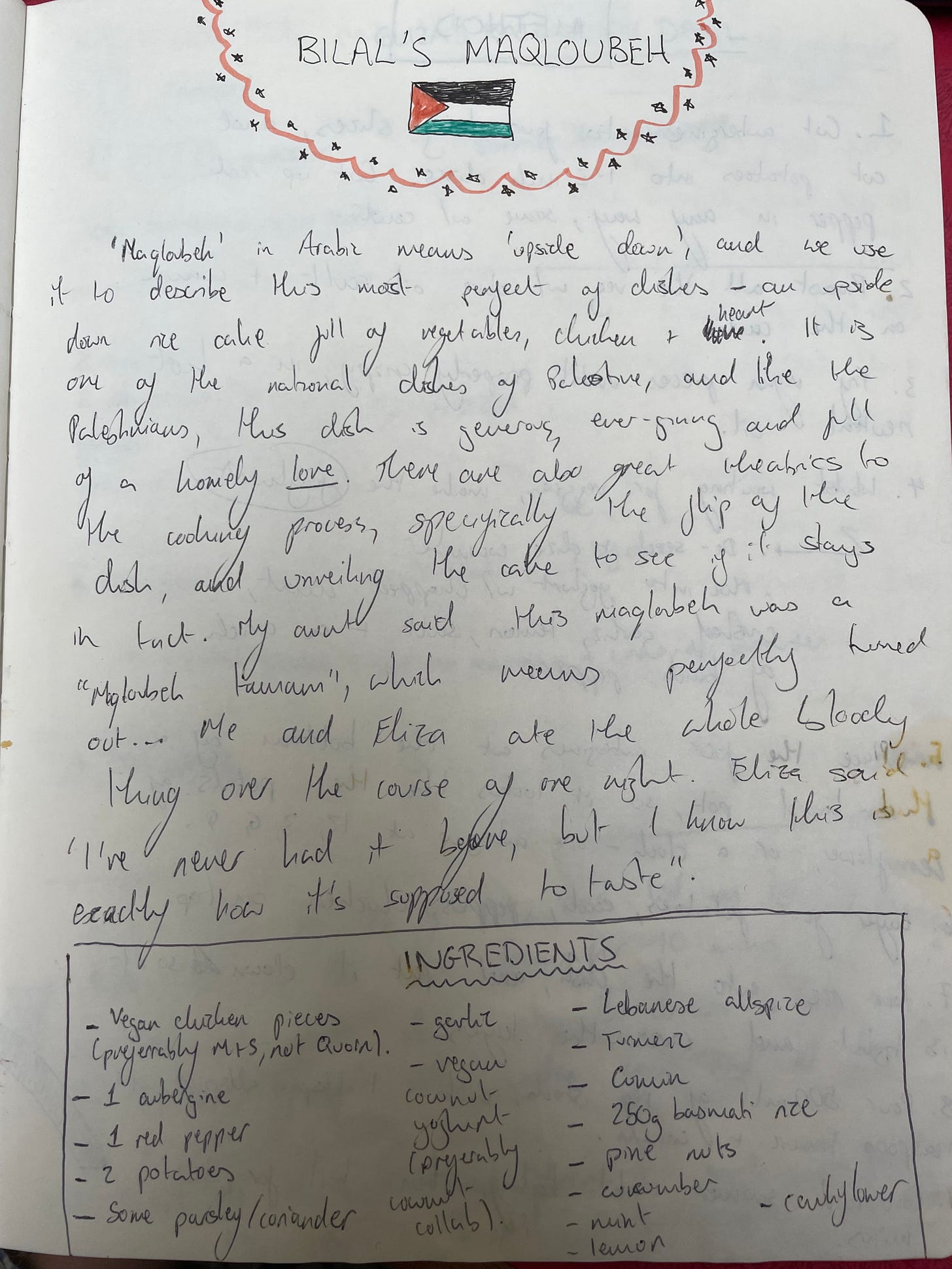Hello! It’s been a while. I last wrote a newsletter in the flutters of summer. Now we reluctantly reacquaint ourselves with winter. So much food has been enjoyed in the interim; adventures to New Malden, Green Lanes, West Dorset, the Loire Valley, Billingsgate market. I want to write about it all and I will. I want to write about what I learnt from running my first supperclub and from running the taco stand at the Three Wheel Drive Festival, and I will. I’ve also been trying to finish a piece about how diet coke makes me feel like a cheerleader - we’ll see how that goes…
But now is not the time to write about any of that. The sickening horror of the past few weeks has been relentless and grows. The scale of loss is unimaginable. Each moment of tragedy, just one piece of a hurricane of pain, deserves a thousand times more space and attention than it gets.
I’ve read a few excellent and important articles recently that I feel are worth sharing. Please read them:
Vengeful Pathologies, by Adam Schatz in The London Review of Books
The View From My Window in Gaza and Cheating Death in Gaza, by Mosab Abu Toha in The New Yorker and The Financial Times
There is a Jewish Hope for Palestinian Liberation. It must survive., by Peter Beinart in The New York Times
The Palestine Double Standard, by Dr Hala Alyan in The New York Times
Yesterday, I read that, among the 7000+ Palestinians who have been killed in Gaza by Israel since Hamas’ October 7th massacre, 47 Palestinian families have been written off the civil register. 47 entire families without a single survivor. Generations of love, knowledge, experience: all lost. Memories, nicknames, recipes: all lost. And far more to come.
Today, I’d like to share a Palestinian family recipe. It was written in our house’s food notebook by B a year or so ago and he has allowed me to share it with you. B didn’t eat meat at the time, so he made it with fake chicken. But swap the fake chicken for chicken thighs if you like - here’s another recipe I found online that might help.
B’s Maqloubeh
B: ‘Maqloubeh’ in Arabic means ‘upside down’ and we use it to describe this most perfect of dishes - an upside down rice cake full of vegetables, chicken and heart. It is one of the national dishes of Palestine, and like the Palestinians, this dish is generous, feeds endlessly, and is full of homely love.
There are also great theatrics to the cooking process, specifically the flip of the dish and unveiling the cake to see if it stays in tact. I sent a picture to my aunt and she said this maqloubeh was a “maqloubeh tamam”, which means perfectly turned out. [Eggsand] and I ate the whole bloody thing over the course of one night. [Eggsand] said “I’ve never had it before, but I know this is how it’s supposed to taste.”
Ingredients
Vegan chicken pieces (preferably M&S, not Quorn)
1 aubergine
1 red pepper
2 potatoes
Some parsley/ coriander
Chicken thighs
Garlic
Vegan coconut yoghurt
Lebanese allspice
Turmeric
Cumin
250g basmati rice
pine nuts
cucumber
mint
lemon
cauliflower
Cut the aubergine into four long slices and cut potatoes into 1-2 inch discs. Cut up red pepper in any way, same with cauli
Roast all the veg with olive oil, salt and lemon on the cauli
Fry the vegan pieces until properly crispy, in a hot neutral oil
Whilst waiting for the veggies, make the yoghurt. Deseed and dice cucumber. Mix into yoghurt with chopped mint, crushed garlic, lemon, salt and a crack of black pepper
Place the four aubergines at the bottom of a thick-bottomed pot, so it looks like the petals of a flower or a clock - one aubergine at 12, 3, 6,9
Layer your potatoes, cauli, peppers, chicken on top
Pour rice into the dish and put it down so it is tight and covers the layers
Pour 500ml of veg stock, with 1 tbsp allspice, 1 tsp turmeric and 1 tsp cumin
Cover and simmer until boiling, then boil for 30 minutes.
Rest and flip
When I was reading about maqloubeh this week, I read about how it’s been used in protest.
I also learnt an Arabic word, nafas:
“Nafas could translate to “breath” or “spirit.” But in the context of cooking, nafas is much more than that. It is an energy some people possess that makes their meals not only good, but exceptional.
A concept used mostly to describe home cooks, not chefs, nafas speaks to a certain intimacy that stretches beyond the physical attributes of a dish. It is about the person preparing it, and what she imparts to the food. It is the time and energy spent selecting and preparing the ingredients; the patient dance back and forth with seasonings until every flavor is just right; the generous presentation and warm hospitality; and, above all, the love of cooking and the desire to feed others
The article goes on to speak to people from the Arab world & diaspora about the people in their lives who possess nafas. One speaks about maqloubeh:
There is no shortage of talented cooks in my family who apprenticed under my grandmother Fatmeh, but we all agree her maqluba is a notch above. When we have cooked it following her exact methods, down to ghee-greasing a nonstick pot with our fingers, and it still doesn’t turn out the way hers did, we are left to attribute our shortcomings to her exceptional nafas.
Many cultures have a similar word to describe this intangible quality that loved family cooks possess. ‘In Korea, the concept used to account for food that tastes better coming from a specific cook is “sonmat” — “hand taste.” Across India, many phrases attest to the same effect, from “haatachi chav” in Marathi (“hand’s taste”) to “maza haath mein hota hai” in Hindi (“the taste comes from the hand”).’
There’s a strong sense of nafas throughout Vittles’ Friday night dinner piece published a few weeks ago: a beautiful reflection on the importance of food for culture, connection, remembering, care and love.
Challah is the centrepiece of my Friday night meal and I can feel the gentle arrival of Shabbat when I’m making it. The touch of dough in my hands, the moment when I feel I’ve got the right amount of flour, the smell that permeates around the house as it bakes.
My mum’s chicken soup was often delicious, but her cooking is something like the culinary equivalent of Jackson Pollock’s paintings. There is chaos and randomness, but a unique creativity, too. Things sometimes burn, but flavours often come together in surprising ways. This would mean that, each week, the chicken soup varied in composition and quality.
Grandma’s is, conversely, consistently sublime. It has a deep flavour, made distinct by the combination of onion, carrot and swede with a roasted hen and white pepper. It was how all her grandchildren’s experimentation with meat exemption – myself included – came to an abrupt end.
Eating and sharing food with family, experiencing and adoring someone’s nafas- I think that these are things at the heart of life and love- what keeps people going and binds people together in the wake of horror. When deaths pile up and become numbers, it can be hard to comprehend the scale of loss and what it means. Thinking about the intangible, as well as tangible, losses that come with each number sharpens me to the loss, the injustice, and fills me with rage.
If you are also angry, please attend your closest march tomorrow to demand a ceasefire and the end to illegal occupation to ensure a safe future for all Palestinian and Jewish people. I will be attending in London - if you don’t have anyone to go with, you can come with me. You can also write to your MP, donate to Medical Aid for Palestinians, support the Palestine Solidarity Campaign, Na’amod, and continue to challenge anti-semitism, islamophobia, and dehumanization in every form.







yes eggs! thank you for your words xox